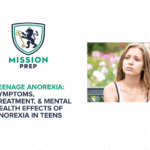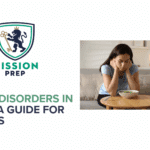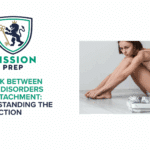Understanding Binge Eating in Teens

Binge eating disorder (BED) is one of the most common eating disorders in the United States. It affects approximately 1.6% of adolescents in the U.S, making it more prevalent than anorexia and bulimia combined.¹
Binge eating disorder involves recurring episodes of consuming unusually large amounts of food, followed by feelings of shame, guilt, and a loss of control. Experts believe many factors have a role to play in this, including hormonal changes, mental health, and their environment.
When it comes to binge eating disorder, it’s normal to have a lot of questions. To help answer your queries, this article will cover:
- What binge eating disorder in teens is
- The relationship between binge eating and mental health
- Causes and risk factors of teen binge eating disorder
- Impact of binge eating on a teen’s life
- Treatment options for teen binge eating disorder

Understanding Binge Eating Disorder in Adolescents and Teens
Binge eating disorder involves frequently eating large quantities of food in short periods. These bursts of overeating tend to feel out of control, both in terms of what’s being eaten and how much.
It’s important to note that those who binge eat may find doing so very distressing. They may feel ashamed or guilty and try to hide their binges. As such, a person’s closest family and friends may not be aware of the problem.
Unlike bulimia, binge eating episodes are not followed by purging or other compensatory behaviors (such as using laxatives or extreme exercising). While those with binge eating disorder may exercise or use another strategy after a binge eating episode, it’s not typical.
Binge Eating and Mental Health in Teens
Research tells us that mental health difficulties are common in adolescents with BED. For example, one study showed that, among teens with BED:²
- 65% have an anxiety disorder in their lifetime
- 32% have major depressive disorder in their lifetime
- 26% have post-traumatic stress disorder in their lifetime
These struggles can begin with academic and social stress at school, friendship changes, experiencing some sort of trauma or family conflict, and may gradually escalate into binge eating disorder as a way of coping.
Binge eating and anxiety can form a vicious cycle. Research shows that anxiety disorders often precede eating disorders and that they can place people at higher risk of developing an eating disorder. Binge eating then worsens anxiety levels, due to the shame and stress that come from binge episodes, which further worsens binging.3
Over time, the repeated cycle of bingeing to soothe emotions, then feeling guilt and distress reinforces unhealthy thought patterns about food, body image, and self-worth. This cycle increases risk for long-term mental and physical health issues if left untreated.
Research has shown that adolescents with BED are at least twice as likely to report major depressive episodes compared to peers without eating disorders.4 In addition, teens with BED have higher rates of irritability, emotional dysregulation, and difficulty concentrating. These symptoms can often be dismissed as typical “teen behavior,” leading parents and educators to miss important warning signs.
Causes of Binge Eating in Teenagers
Research isn’t able to tell us a specific cause of binge eating disorder. However, it can highlight many factors that, when present, may put teens at higher risk of developing binge eating disorder. These risk factors tend to be a mixture of biological, psychological, and environmental elements.
Biological Risk Factors of Binge Eating in Teens5
- Genetic predisposition: Having a first-degree relative with an eating disorder increases a teen’s risk of developing BED.
- Hormonal changes in adolescence: Hormone changes (especially estrogen) may increase a teen girl’s risk of developing BED.
- Appetite and metabolism genes: Variants of specific genes (FTO and MC4R) related to body weight and appetite are linked to higher rates of binge eating.
- Brain reward system pathways: Certain dopamine (happy hormone) receptors may affect the brain’s sensitivity to the feeling of reward, which could predispose some teens to binge eating tendencies.
- Gut-brain axis and microbiome: Gut microbiota imbalances and inflammatory or autoimmune conditions may include appetite regulation and binge eating.
Psychological Risk Factors of Teen Binge Eating Disorder5
- Personality traits: High neuroticism, perfectionism, impulsivity, and compulsivity may increase a teen’s risk of developing BED.
- Emotion regulation: Teens who struggle to regulate, identify, and express their emotions tend to be more likely to experience BED, as emotional dysregulation tends to be associated with binge-type eating.
- Comorbid mental health conditions: As we’ve covered above, mental health conditions may form a vicious cycle, feeding into binge eating tendencies.
- Body image concerns: Body dissatisfaction, internalisation of the “thin” ideal, and fear of people thinking badly about them may become strong psychological drivers for BED.
Environmental Risk Factors of BED in Adolescents5
- Family environment: Parental eating disorders, as well as high levels of criticism from parents on a teen’s shape and weight, are risk factors of BED in adolescents. Family environments with high conflict levels can also contribute.
- Childhood adversity: Experiences of abuse, neglect, or family disruption in childhood tend to be strongly linked to binge-type disorders.
- Peer and media influences: Online bullying related to weight, peer pressure, and exposure to media promoting the “thin” body ideal can increase a teen’s risk of BED.
- Sociocultural factors: Society’s emphasis on weight control and dieting can create stress and pressure that can contribute to binge eating.
Effects of Binge Eating
If left untreated, binge eating in adolescents and teens can set them up for psychological challenges in adulthood, especially around food. Studies indicate that BED often persists into adulthood, with symptoms intensifying under the pressures of college, work, and relationships.6
Binge eating disorder can impact teens in various ways, seeping into their physical and emotional health and lifestyle. Let’s explore each in turn:
Physical Impact of Binge Eating Disorder in Teens
Neurobiological research studies show that binge eating can actually change brain pathways relating to reward and impulse control.7 This means that teens are not simply choosing to binge, but experience physical changes in how their brain responds to stress and food cues, which dictate their urges. These changes can make it harder to break the cycle without structured and targeted binge eating therapy for adolescents and teens.
- Increased risk of obesity and metabolic syndrome.
- Increased risk of type 2 diabetes, high blood pressure, and high cholesterol.
- Gastrointestinal discomfort and bloating.
- BED can interrupt normal growth and development of the mind and body, especially during adolescence.7 Rapid changes that occur due to BED can lead to hormonal imbalances, which may affect puberty and menstrual cycles in girls. Boys may experience reduced testosterone levels and lower energy. This can make it harder for teens to
Emotional Effect of Binge Eating Disorder in Teens
Then there is the emotional toll, which cannot be underestimated. Teens struggling with BED often describe feeling out of control and hopeless. Without professional help, these feelings can continue to grow, and the risk of mental health difficulties, as well as other emotional problems, can increase. Some of these emotional problems may be:
- Intense guilt and self-loathing
- Strained family relationships
- Risk of chronic depression and anxiety disorders
- Heightened body dissatisfaction and poor self-image
- Social withdrawal and isolation, as the shame they feel around binge eating and purging, makes teens avoid situations involving food
- Higher rates of suicidal ideation compared to peers without eating disorders.
Influence of BED on a Teen’s Lifestyle
- Declining school performance, as a result of constant tiredness and poor concentration from irregular and unhealthy eating patterns.
- Growth and development interruptions may make it difficult for teens to actively take part and sustain interests in sports, academics, and social life, further reinforcing feelings of isolation.
- Sleep disturbances, which in turn can worsen their mood and anxiety and further fuel unhealthy eating patterns.³
The earlier binge eating counseling and treatment for adolescents and teens begin, the higher the chances are of preventing these life-changing complications.
Treatment for Binge Eating in Teens
The good news is that effective treatment for binge eating in teens is available. To suit teens with different needs, treatment takes a multi-pronged approach, addressing both their physical and emotional needs.
- Cognitive Behavioral Therapy (CBT-E): The gold standard for BED, teaching teens to identify and change harmful thought patterns.6
- Interpersonal Psychotherapy (IPT): Addresses relationship triggers linked to binge episodes.
- Family-Based Therapy (FBT): Parents actively support recovery by taking charge and reinforcing structured eating habits.
- Nutritional counseling: Working with nutritionists helps restore healthy eating patterns and normalize food relationships.
- Inpatient treatment: Recommended for teens with severe psychiatric symptoms, medical complications, or suicidal ideation. These programs provide 24/7 monitoring, structured meals, and intensive therapy to help replace unhealthy ways of thinking and interacting with food.
Binge eating disorder recovery in teens and young adults relies on getting them the right help when unhealthy coping habits are forming. Teens who receive CBT or FBT show significant reductions in binge episodes and overall improved emotional regulation and mental health. But to make sure recovery for teens with BED is effective and long-lasting, they must have access to targeted therapy and family support to build healthy coping skills and relapse prevention strategies.
How Parents and Families Can Help a Teen With Binge Eating Disorder
Parent and family help for teens with binge eating disorder means creating a safe, structured, and compassionate environment that allows them to commit to a treatment plan. Parents can support a teen struggling with binge eating disorder by:
- Encouraging open dialogue without judgment.
- Avoiding comments about weight or appearance.
- Promoting balanced eating at family meals.
- Supporting therapy attendance and reinforcing coping skills.
- Monitoring triggers such as school pressure and social media trends.
- Encouraging positive outlets, such as art, journaling, purposeful exercise, or mindfulness practices.
It’s important to know that, as parents, all we can do is support a teen’s journey by encouraging healthy coping strategies and encouraging them to talk with a trusted professional. We can also reach out for support for ourselves to get help with any underlying issues, such as anxiety, depression, and trauma.

Mission Prep: Professional Support for Teenage Mental Health
At Mission Prep, we are committed to supporting your children through mental health resources, education, guidance, and therapeutic support. We do not offer therapy specifically for eating disorders. However, we can support teens with any underlying mental health issues, and we can help them to develop healthy coping strategies.
We offer a variety of treatment options, right from weekly therapy sessions all the way to inpatient treatment. Our programs focus on building resilience, emotional regulation, and managing mental health difficulties.
We are also well-placed to offer guidance on the best resources out there for BED and other eating disorders. So, if you believe your teen is struggling with an eating disorder and needs support, please reach out: We’re happy to help.
Call us today for guidance and support.
FAQs About Binge Eating Disorder in Teens
1. Is my teen just over eating?
Many people, including teens, may overindulge on occasion. However, if binge eating is persistent and frequent, this is a sign of binge eating disorder. If your teen expresses a lack of control around their bingeing sessions, this is also a sign of BED.
2. Do all teens with BED become overweight?
No. Teens of all body sizes can be affected by BED. If you’re worried that your teen may be struggling with BED but you haven’t seen any weight gain, it’s still important to reach out for support.
3. Is binge eating a way to cope with emotions?
Often, yes. If teenagers feel overwhelmed and anxious, emotional eating can give temporary relief. However, when binge eating becomes a regular thing, it’s a sign of BED.
4. What’s the difference between BED and bulimia?
Teens with bulimia are stuck in cycles of binge eating followed by purging. While compensatory behaviors like purging and excessive exercise are sometimes seen in BED, they’re not common.
5. Can teens recover from BED without professional help?
Professional therapy is crucial for BED recovery, but family support and working with your teen are equally important. If left untreated, unhealthy thinking and eating patterns can deepen BED and mental health difficulties, which can follow them into adulthood.6
6. Does binge eating mean a teen is lazy?
Certainly not. BED is a psychiatric disorder, not a choice or a sign of laziness.
7. How long does treatment take?
The timeline for recovery for a teen with BED can vary. Some respond within months, while others need longer-term care. But targeted and tailored support helps sustain their recovery.
References
- National Institute of Diabetes and Digestive and Kidney Diseases. (2025, August 12). Definition & Facts for Binge Eating Disorder. https://www.niddk.nih.gov/health-information/weight-management/binge-eating-disorder/definition-facts#:~:text=Binge%20eating%20is%20when%20you,upset%20by%20your%20binge%20eating.
- Hudson, J. I., Hiripi, E., Pope Jr, H. G., & Kessler, R. C. (2007). The prevalence and correlates of eating disorders in the National Comorbidity Survey Replication. Biological Psychiatry, 61(3), 348–358. https://doi.org/10.1016/j.biopsych.2006.03.040
- Rosenbaum, D. L., & White, K. S. (2013). The role of anxiety in binge eating behavior: a critical examination of theory and empirical literature. Health Psychology Research, 1(2), 19. https://doi.org/10.4081/hpr.2013.e19
- Swanson, S. A., Crow, S. J., Le Grange, D., Swendsen, J., & Merikangas, K. R. (2011). Prevalence and correlates of eating disorders in adolescents. Archives of General Psychiatry, 68(7), 714–723. https://doi.org/10.1001/archgenpsychiatry.2011.22
- Barakat, S., McLean, S. A., Bryant, E., Le, A., Marks, P., Aouad, P., Barakat, S., Boakes, R., Brennan, L., Bryant, E., Byrne, S., Caldwell, B., Calvert, S., Carroll, B., Castle, D., Caterson, I., Chelius, B., Chiem, L., Clarke, S., . . . Maguire, S. (2023). Risk factors for eating disorders: findings from a rapid review. Journal of Eating Disorders, 11(1). https://doi.org/10.1186/s40337-022-00717-4
- Lock, J., & Le Grange, D. (2009). Help your teenager beat an eating disorder (2nd ed.). New York, NY: Guilford Press.
- Kessler, et al. The prevalence and correlates of binge eating disorder in the World Health Organization World Mental Health Surveys. Biological Psychiatry, 73(9), 904–914. https://doi.org/10.1016/j.biopsych.2012.11.020



















